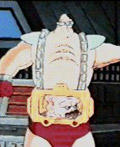Not fighting evil, but fearing death

When Austin Powers had himself frozen solid so he could go back in time to defeat Dr. Evil, nobody seemed to question that choice on grounds of bioethics. We understood. We even sympathized. The global community demands that the insights of international people of mystery be available, in the flesh, to other generations.
How about the 765 folks the Chicago Tribune says have made arrangements to have their bodies--or more ghoulishly, just their heads--cryonically frozen at their death to be potentially reinvigorated when science shall allow? What's their rationale? I don't see hordes of disco fans chasing these would-be immortals down the street, and haven't noticed their endorsement on any bizarre household appliances.
I doubt we'll have to seriously confront the ethical implications of this technology succeeding for awhile yet. Frozen brain tissue cracks "like when you drop an ice cube into a glass of Coke", apparently, suggesting that a few technical bugs might need to be resolved before the scientists of tomorrow will be able to do anything with these bizarrely treated human shells. But future developments aside, we have among us now nearly a thousand folks so afraid of the infinite they're signing over thousands to have their bodies gruesomely pickled. Forget the future, where sitcoms full of anachronistically cultured walking heads will practically write themselves. What about this current fear?
People who choose to freeze accept, apparently, that death will come. You have to assume that heaven or any afterlife doesn't mean that much to them if they're prepared to leave it at the whim of some ninetieth-century lab coat. (Unless they believe themselves headed for the full-out Dante hell and like the image of being whisked back to earth and life, thumbing their nose at the other poor sinners who didn't finish up in a cold chamber in an office park.) Apparently, these folks are just so dedicated to life that they're zombifying themselves to spin the wheel for another slice of it--life without loved ones, almost certainly beyond any famliarity of current culture. Life, perhaps, in an unfamiliar body, for those banking that "future scientists will be able to grow a new body for [them] or else extract the personality and memories from the brain".
 Hey Krang, ever think of leaving, say, a memoir for future generations, or a nice photo album? Just a lot less, you know, horrific.
Hey Krang, ever think of leaving, say, a memoir for future generations, or a nice photo album? Just a lot less, you know, horrific. Do you suppose it occurs to them that science tends to lose a few subjects before coming up with the right protocol? Wouldn't you just know you'd be the one who ends up in a Hazardous Waste bin while all the other 'sicles are running around going "Cool! Flying cars!"
And suppose they do reanimate someone, what then? You live again, and begin again . . . the process of dying. Is the idea to bounce back only when they've eliminated the little problem of eventual death? (Do they stamp that on your cooler: "This Better Be Good?!") The Brothers Grimm wrote horror stories about people condemned to wander the earth forever. Simone de Beauvoir's envisioning of such a life will chill your blood. Geez, didn't they read Tuck Everlasting back in the day? Even children's authors warn against the dream of eternal earthly life. One practical objection, to people who obviously believe their own stories to be of some transcendental importance, is the surety that in a world with no turnover one would inevitably, and but quick, become lost, forgotten and irrelevant. Really, if you'll never lose anyone, you have no need to remember them.
Catholic teaching opposed cremation for a long time, and I think its current position--that human ashes may be buried but not scattered--is reasonable. Certainly when you see horrors like this being executed by scrupleless scientists on scared and gullible people, you can understand where the Church came from all those years. The reality of a body in a grave with a marker is a sign to respect the life that occurred and ended. Respect for a corpse shows respect for the life that inhabited it and, more globally, demonstrates the omnipresent human wonder at being in a body and yet more than a body. I won't insist--not today--that anyone believe as I do about our prospects after death. But I implore them to hope for better than existence as a human tissue sample, a brain in a body it was not given, a soul uprooted from its country and with no way to die.


0 Comments:
Post a Comment
<< Home